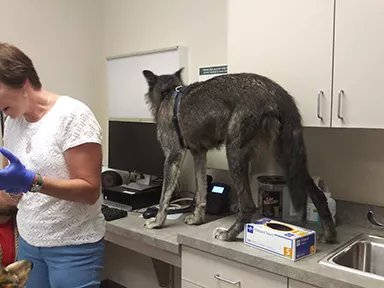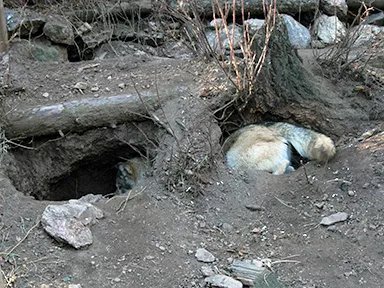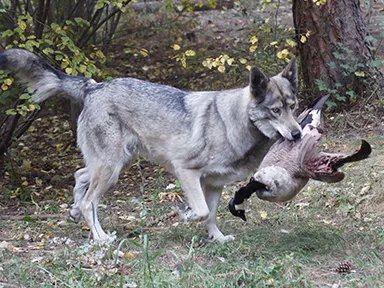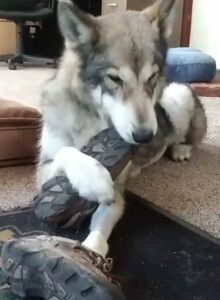 The idea of owning a wolf, of taming a slice of the wild, is an enticing one that many people in the United States and around the globe often fall victim to. Unsurprisingly, the reality of keeping a wild animal such as a wolf or wolf dog as a pet usually falls far short of the romanticized version most people desire. This leaves hundreds of thousands of captive-born wolves and wolf dogs, and their owners, in difficult, and often desperate, situations. Though W.O.L.F. is not in favor of breeding wolves with dogs, keeping these animals as pets, or breeding them for profit or entertainment, W.O.L.F. understands that keeping captive-born wolves and wolf dogs as pets is a part of our society today that is unlikely to go away any time soon. As such, W.O.L.F. believes that, once born, these animals deserve to live decent lives.
The idea of owning a wolf, of taming a slice of the wild, is an enticing one that many people in the United States and around the globe often fall victim to. Unsurprisingly, the reality of keeping a wild animal such as a wolf or wolf dog as a pet usually falls far short of the romanticized version most people desire. This leaves hundreds of thousands of captive-born wolves and wolf dogs, and their owners, in difficult, and often desperate, situations. Though W.O.L.F. is not in favor of breeding wolves with dogs, keeping these animals as pets, or breeding them for profit or entertainment, W.O.L.F. understands that keeping captive-born wolves and wolf dogs as pets is a part of our society today that is unlikely to go away any time soon. As such, W.O.L.F. believes that, once born, these animals deserve to live decent lives.
The details provided below are intended as an educational tool to aid individuals considering owning a wolf dog in making an informed decision as to whether or not they are capable of appropriately caring for a wolf dog in their home. If you are interested in owning a wolf dog, please carefully read and consider the information provided here before making your decision. W.O.L.F. strongly recommends researching wolf dog care and appropriate positive reinforcement training techniques. W.O.L.F. also recommends that you get involved with a captive-born wolf dog sanctuary by speaking with staff and volunteering if possible, to get a first-person perspective on the challenges in caring for one of these animals. Lastly, if you still feel you are capable of providing an appropriate, stable, and life-long home for a wolf dog, please consider rescuing one of the many thousands of abandoned, neglected or abused individuals in desperate need of a loving home.
Are you prepared to own a wolf dog? Read through this page then click here to take the quiz.
LEGAL CONSIDERATIONS
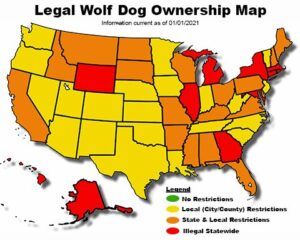 In many states, counties, cities, and towns, it is illegal to own a wolf dog. Even if it is legal, there are likely to be restrictions on what percentage wolf can be owned and/or requirements for owners to acquire additional permits to keep a wolf dog legally. It is imperative for anyone interested in owning a wolf dog to research thoroughly and comply with all laws and permitting requirements at the state and local levels prior to acquiring a wolf dog. Local restrictions and requirements may be more stringent than state restrictions. It is also important to remember that local, state, and federal laws are constantly being revised, so an owner in an unregulated area may suddenly find themselves living with newly imposed wolf dog bans or restrictions. This could result in the owner having to give up the animal, having it confiscated by law enforcement and euthanized, paying fines or permitting fees to be allowed to keep the animal, or moving to another location where wolf dogs are still legal to own.
In many states, counties, cities, and towns, it is illegal to own a wolf dog. Even if it is legal, there are likely to be restrictions on what percentage wolf can be owned and/or requirements for owners to acquire additional permits to keep a wolf dog legally. It is imperative for anyone interested in owning a wolf dog to research thoroughly and comply with all laws and permitting requirements at the state and local levels prior to acquiring a wolf dog. Local restrictions and requirements may be more stringent than state restrictions. It is also important to remember that local, state, and federal laws are constantly being revised, so an owner in an unregulated area may suddenly find themselves living with newly imposed wolf dog bans or restrictions. This could result in the owner having to give up the animal, having it confiscated by law enforcement and euthanized, paying fines or permitting fees to be allowed to keep the animal, or moving to another location where wolf dogs are still legal to own.
Though we strive to provide up-to-date information, laws are constantly changing. Always research current laws and restrictions by contacting your city, county, and state governments prior to considering owning a wolf dog.
BUYER BEWARE
 BUYER IGNORANCE: Wolf dogs can sell from anywhere between $300 to $5,000 per pup. Because of this and the fact that most people do not know what wolf dogs looks like, there are many unscrupulous individuals that want to take advantage of the ignorance of a purchaser for “easy money.” Often, these individuals will exaggerate the wolf content of the animals they are selling. Many simply sell northern breed dogs, such as huskies, as wolf dogs or even pure wolves. Conversely, some sellers may try to get around legal restrictions by claiming wolf dogs are lower content than they really are, or even say they are domestic dogs. More often than not, this leads to hundreds of domestic breed dogs being mislabeled as wolf dogs and euthanized. It also results in many wolf dogs in the hands of owners who were expecting a purely domestic dog, again resulting in the animals being given up and generally euthanized. Do not base the content of a wolf dog on the seller’s asking price.
BUYER IGNORANCE: Wolf dogs can sell from anywhere between $300 to $5,000 per pup. Because of this and the fact that most people do not know what wolf dogs looks like, there are many unscrupulous individuals that want to take advantage of the ignorance of a purchaser for “easy money.” Often, these individuals will exaggerate the wolf content of the animals they are selling. Many simply sell northern breed dogs, such as huskies, as wolf dogs or even pure wolves. Conversely, some sellers may try to get around legal restrictions by claiming wolf dogs are lower content than they really are, or even say they are domestic dogs. More often than not, this leads to hundreds of domestic breed dogs being mislabeled as wolf dogs and euthanized. It also results in many wolf dogs in the hands of owners who were expecting a purely domestic dog, again resulting in the animals being given up and generally euthanized. Do not base the content of a wolf dog on the seller’s asking price.
WOLF CONTENT: Genetics is a complicated science, so even if there is a comprehensive record of breeding ancestry for an individual, it can have little bearing on exactly what or how the wolf genes in any one individual are expressed. It is possible to have a high-content wolf dog act like a domestic dog or a doggy-looking wolf dog act like a wolf. There have even been instances in which owners with legal and perfectly well-behaved wolf dogs have had their animals confiscated simply because they “look too high-content”. It is also important to remember that genetics are not the only thing that shape an individuals personality. Life experiences are also important. Additionally, a wolf dog’s personality is not fixed at birth and their behaviors will change over time based on life experiences. You may find an animal that was once easy to manage has become increasingly more difficult to live with as they age. Just because you know an individual’s genetic make up does not mean you will know how that individual will behave.
FINANCIAL CONSIDERATIONS
The financial cost of owning a wolf dog is not like that of owning a domestic dog. Like any exotic animal, wolf dogs have different and specialized needs, and caring for them properly is more costly from a monetary standpoint and is also far more involved with time and resources.
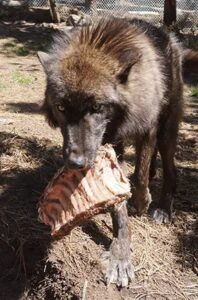 DIET: Wolf dogs require a specialized diet. Unlike dogs, who are omnivores and can successfully digesting a wide range of food options, wolves are primarily carnivores and are less capable of deriving all the necessary nutrients from a commercial pet food diet. Therefore, the daily diet for a wolf dog should be made up of raw meat and bones and supplemented with high-quality, grain-free kibble or nutritional supplements. Feeding a wolf dog a balanced and appropriate diet could easily cost over $5,000 per year.
DIET: Wolf dogs require a specialized diet. Unlike dogs, who are omnivores and can successfully digesting a wide range of food options, wolves are primarily carnivores and are less capable of deriving all the necessary nutrients from a commercial pet food diet. Therefore, the daily diet for a wolf dog should be made up of raw meat and bones and supplemented with high-quality, grain-free kibble or nutritional supplements. Feeding a wolf dog a balanced and appropriate diet could easily cost over $5,000 per year.
LICENSING: Where there are restrictions or regulations, there will likely be both one-time and recurring fees that owners will need to comply with to avoid being fined or being charged with a crime for the possession of a regulated animal without a permit. While some states may have minor fees associated with owning wolf dogs, others require local, state, and/or federal licenses. Additionally, many permits require owners to comply with specific housing or care requirements, which may add additional costs to owning a wolf dog.
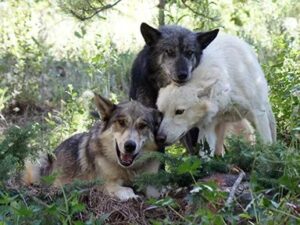 COMPANIONSHIP: Another economic consideration is that it is always recommended to have at least two wolf dogs, which will double the cost for daily care for the animals. Wolves and wolf dogs are very social animals and do not do well on their own. Being alone often leads to destructive behaviors and can result in major repair bills to fix what the wolf dog destroys while alone.
COMPANIONSHIP: Another economic consideration is that it is always recommended to have at least two wolf dogs, which will double the cost for daily care for the animals. Wolves and wolf dogs are very social animals and do not do well on their own. Being alone often leads to destructive behaviors and can result in major repair bills to fix what the wolf dog destroys while alone.
CONTAINMENT: Wolf dogs are persistent and extremely athletic, easily capable of jumping six feet into the air from a stand still. This makes them accomplished escape artists, and owners must have secure and proper containment from the outset. If an individual gets a wolf dog without proper containment already in place and the animal escapes, he or she will likely be able to get through or around any later modifications made to the containment fencing. The wolf dog now knows it can get out, so it is likely to keep trying despite new obstacles.
It is recommended to have at least a half acre fenced area with proper fencing all around the enclosure. To reduce the chances of a wolf dog being able to escape, fencing should be at least eight feet tall and have dig barriers (buried fencing, concrete edging, etc) around the perimeter of the entire enclosure. It may also be necessary to have “lean-ins” at the top of the fencing. This is additional fencing that leans into the enclosure and helps to prevent an animal from climbing or jumping over the fence. Proper fencing materials can cost between $3,000 and $5,000, not including construction expenses. There may be additional costs for required building permits, negotiations with HOA’s, and/or the purchase of the type of land required for building legally.
SOCIAL CONSIDERATIONS
NEOPHOBIA: After about 6 months of age (or sometimes even younger), most wolves and wolf dogs become increasingly neophobic, or afraid of new things, experiences, and/or people. This means that change is very stressful for most wolf dogs, especially high content wolf dogs and wolves. Unlike most domestic dogs, a wolf dog will often avoid or very cautiously approach new situations. When uncertain or frightened, most wolves and wolf dogs will preferentially choose to run away or hide. If denied the opportunity to remove themselves from the situation, they may react fearfully or “shut down” from the stress, which can not only mentally harm the animal but also potentially compromise the animal’s physical health as well. People owning a wolf dog should be prepared to commit to providing that individual with a stable home for the entirety of the animal’s life, which can easily be fifteen or more years. While wolf dogs can be worked with to overcome their fears, owners must realize that this will be a very slow, time-intensive, and lifelong process.
STRANGERS: A wolf’s inherent neophobia means that wolf dog owners should be cautious when introducing their wolf dog to new people and should take all introductions slowly so as not to overwhelm the wolf dog. In a study done with hand raised wolf pups from the Family Dog Project, the experiment found that wolves, unlike dogs, would approach unfamiliar people with apprehension, showing behaviors like crouching and tail tucking. It also means that most wolf dogs dislike and fear being forced to leave what they consider their territory and traveling with a wolf dog may be extremely stressful to the animal or even impossible. If owners want a pet that can “go everywhere” with them, a wolf dog is definitely not that animal.
VACATIONING: Many people enjoy being able to take vacations and travel, which is severely limited when owning a wolf dog. Unlike most domestic dogs, wolf dogs cannot go to a boarding kennel when the owner wants to get out of town. Because of this, owners have far fewer vacation options. Owners may take the animal with them (limiting travel destinations to only places where wolf dog ownership is legal or risking the animal being confiscated by law enforcement), hire a private pet sitter and take the time to socialize the wolf dog with the pet sitter (which is time consuming and quite pricey), or decide to forego any vacation.
CHILDREN: Wolf dogs should never be unsupervised around any child for any reason. It is strongly recommended that those interested in owning wolf dogs do not have children or plan on having children until the wolf dog passes away. Wolf dogs are large, energetic animals who play much rougher than many domestic dogs. Also, many wolf dogs are fascinated with, or possessive of, children. This can lead to a child being unintentionally injured by a wolf dog as it tries to play with or care for the “human pup.” It may also lead to an adult or child being injured if the wolf dog perceives the person as trying to take its “pup” away.
VETERINARY CARE
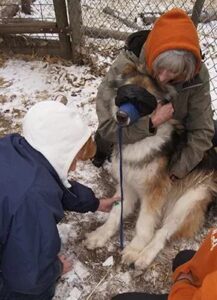 Finding quality veterinary care for a wolf dog can be extremely challenging. Many veterinarians will not treat wolf dogs for various liability concerns. Veterinarians who are willing to treat wolf dogs may not be willing to treat the animal while other clients are in the clinic. This means that the vet will either have to meet owners outside of normal business hours (which can be expensive) or have the appointment in the clinic parking area.
Finding quality veterinary care for a wolf dog can be extremely challenging. Many veterinarians will not treat wolf dogs for various liability concerns. Veterinarians who are willing to treat wolf dogs may not be willing to treat the animal while other clients are in the clinic. This means that the vet will either have to meet owners outside of normal business hours (which can be expensive) or have the appointment in the clinic parking area.
There is also the issue that many wolf dogs are unwilling to travel in vehicles, which may require an owner to locate a veterinarian who is willing to treat wolf dogs at the owner’s home. This may cost significantly more than a normal vet appointment for a regular dog.
Even if the vet is willing to treat the wolf dog and the owner is willing to pay extra for the care, there are additional issues that arise. For example, while it is recommended that wolf dogs receive a rabies vaccination, the vaccine is not specifically labeled for use in wolf dogs and is therefore not legally considered proven to prevent rabies in them. This means that if a wolf dog does bite someone, even if that wolf dog is current on the rabies vaccination, the animal would still be considered a rabies risk and may be euthanized to conduct a reliable necropsy on the brain of the animal.
WOLF BEHAVIOR IN WOLF DOGS
WOLF VS. DOG: To understand the behavioral differences between wolves and dogs, it is important to understand that dogs are essentially perpetual puppies and never achieve the mindset of a mature, adult canine, while wolves and wolf dogs do. This means that when a wolf dog reaches adulthood (usually around two to four years of age), there is often a noticeable shift in their personality as well as changes in their interactions with their owners, animal companions, and strangers. It is important to know that these changes do not necessarily make the animal dangerous but can make caring for them more challenging. Many owners are unaware this shift happens and struggle to adjust to their wolf dog’s new attitude when it occurs, usually prompting owners to confine or give up the animal in frustration.
TERRITORIALITY: Wolf dogs have many similar behaviors to wolves, which is not always ideal in a home setting. Wolves are territorial, and this means a wolf dog may become possessive of things in a home, which may lead to urinating and/or aggression in the home. It also means that many wolf dogs will likely see unfamiliar dogs as intruders and react defensively or aggressively when encountering a new dog. This is something all wolf dog owners should be cognizant of and take precautions for if exercising their animals where there is the possibility of encountering strange dogs.
MOUTHINESS: Wolf dogs, like wolves, are very energetic, curious creatures and, if not given proper enrichment, exercise, and companionship, can become destructive. This is because the way that wolves explore the world is with their teeth. As a result, wolf dogs are much more mouthy than dogs, both with their environment and their “human pack”. While this behavior can be trained out of dogs, it is very difficult to train out of wolf dogs.
TRAINING: Wolves, and most wolf dogs, are very intelligent, independent, and persistent, making them skilled problem solvers, which owners often find frustrating. This is because wolves, unlike dogs, did not have evolutionary pressures that made them rely on humans for their survival and are more determined to find solutions to perceived problems on their own. As a result, while wolf dogs are just as capable of learning every command that dogs can, wolf dogs are generally unmotivated to please their owners without a valuable reward being offered in exchange, thus making them less likely to obey commands reliably.
PREY DRIVE: Another issue that is extremely hard to train out of wolf dogs is their high prey drive. Though there are many definitions and usages for the phrase “prey drive,” what we are referring to here is the instinctive inclination of a carnivore to find, pursue, and capture prey, also commonly known as “predatory behavior.” In wolf dogs, this can lead to issues with the animal hunting small creatures like cats, chickens, squirrels, and birds, and in some cases livestock, such as goats, if given the opportunity. They may also escape, and travel far from home. It is important to note that prey drive is not the same as aggression. A wolf dog can have a high prey drive but not be aggressive towards its owners and/or its companions.
WINTER WOLF SYNDROME: Many wolf dogs, especially high content wolf dogs, will experience what is known as Winter Wolf Syndrome (also called seasonal aggression) to varying degrees. Winter Wolf Syndrome is a seasonal change in an individual’s behavior that typically occurs sometime between November and April. It is associated with the hormonal changes that occur with wolves’ natural breeding cycle and can sometimes even be observed in spayed or neutered individuals. Behavioral changes are extremely variable and individualized, ranging from mild grumpiness to extreme possessiveness and aggression. This means that owners must be aware of seasonal behavior changes and be prepared for the possibility that they may need to be able to care for a wolf dog with whom it is unsafe to interact directly for up to five months out of the year.
THE WOLF DOG CRISIS
 Many people desire the traits of wild wolves in a pet. In fact, in the United States, the wild animal trade is a multi-billion-dollar industry. However, many people are totally unprepared to own these animals due to a lack of knowledge about how to care for them. It leads to the mistreatment and/or death of many wolf dogs. In the United States, there are an estimated 250,000 to 500,000 wolves and wolf dogs owned as pets. The mistreatment of these animals is extremely high, with the majority of wolf dogs facing some sort of abuse. In fact, 90% of pet wolves and wolf dogs are euthanized by the age of two. This is why it is critical to consider the responsibility of owning a wolf dog before getting one.
Many people desire the traits of wild wolves in a pet. In fact, in the United States, the wild animal trade is a multi-billion-dollar industry. However, many people are totally unprepared to own these animals due to a lack of knowledge about how to care for them. It leads to the mistreatment and/or death of many wolf dogs. In the United States, there are an estimated 250,000 to 500,000 wolves and wolf dogs owned as pets. The mistreatment of these animals is extremely high, with the majority of wolf dogs facing some sort of abuse. In fact, 90% of pet wolves and wolf dogs are euthanized by the age of two. This is why it is critical to consider the responsibility of owning a wolf dog before getting one.




